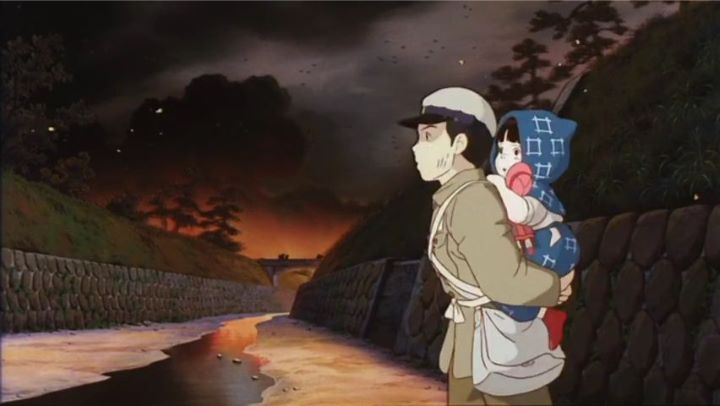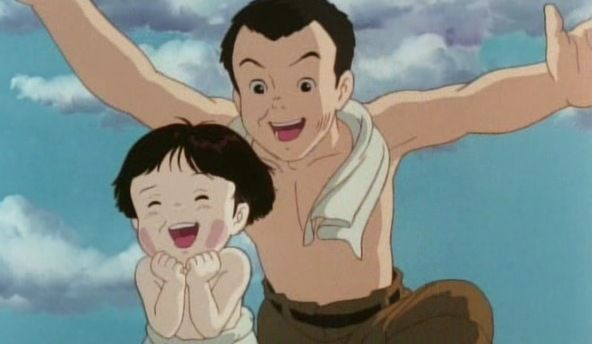








Walt Disney Studios had the American release rights to almost all of Studio Ghibli's movies. The one notable exception is "Grave of the Fireflies," made in 1988 and directed by Isao Takahata. This also happens to be, by far, the darkest and saddest film Studio Ghibli has been attached to, and remains one of the saddest movies I've ever watched. In World War II, cities in Japan were bombed. This film focuses on the lives of two siblings, Seita and his younger sister Setsuko, and the challenges they endure when their city is destroyed. Their house is in ruins, and their mother was fatally burned. They were able to move in with their Aunt in another city, but after being reminded constantly of how much of a bother they are to her, they attempt to move in an abandoned bomb shelter. This tragic story ends with these forgotten war children struggling to get food while Seita still tries to maintain his pride and keep his sister happy, but both still die. I've revealed most of the story for you, and it shouldn't matter. This is a depressing story loosely based on real events from a survivor of this period of time, and you can tell from the beginning that both children are doomed to die. The draw to this is to feel the devastating emotions in these horrible situations: how will you feel when you see the mother's body being thrown onto a pile of dead corpses? How will you feel when the brother resorts to stealing to keep him and his sister alive? How will you feel when you watch a malnutritioned sister weakly invite her brother to eat stones and marbles she found on the floor? While the tone of the film is obvious, how will you feel when you see the sister dance in joy for a fruit candy, or watch their eyes light up when they release fireflies in their tent? This is a sad film without question, and little moments of hope are dispersed to help keep you from committing suicide during your viewing, but also to make the bad moments all the more stronger. All of this comes together to make one of the most powerful anti-war films I know of. That is... if the themes or messages being presented were a little more clear.The intended themes of this film have been debated a bit. Anti-war is the obvious one, but the focus on the war seems more like a backdrop or a setting as opposed to the message. The older people still alive in the film, from the aunt to the farmers to the doctors, seem not able to help these poor children who have lost their family and their home. Therefore, this can be viewed as commentary on our adults and how they treat children and the needy. Also, the brother is plagued by hating how adults have treated them, and takes this as an excuse to become independent and live away from them all, at the expense of his and his sister's health (it's pointed out that their aunt would take them back if they worked harder and took more responsibility for themselves). Thus, this can be a commentary on children not having respect for their elders. The strange use of transitions and overlaying of flashbacks also make you question how much of this is meant to be real in the world of the film, or if parts are meant to be fiction to symbolize the original author's real history. More simply, many people are shown both suffering and living on as if nothing bad had happened around them: what does this show about our views of suffering around us? The themes can be debated at great length, enhancing the academic value here. The biggest problem is likely that this isn't entertaining to watch. It isn't meant to be, but as a movie, it feels like it isn't succeeding somewhere when I'm not entertained, or deeply moved enough. This entire experience feels very much like those serious novels you had to read in English class in high school, the sort of book you wouldn't enjoy, but would still call a masterpiece in its own right. Also, the visuals have aged (almost all anime pre-1990 has), and the English dub doesn't come close to the poetic realism the Japanese audio provides, although the Japanese actors do an exceptional job (while Japanese is recommended, Sentai Filmworks provide both a brand new dub and the original un-enhanced English dub to watch). The music isn't memorable outside the film, but enhances the haunting moments during the film plenty. I will also mention my thoughts on anti-war anime in general. Japan was devestated by the events of World War II, and their films and novels always seem to be at least slightly influenced by that period. Some films like "Grave of the Fireflies" get released every decade or two, re-telling the on-ground events and horror of the time, and when including countries outside of Japan, you'll find new World-War-II horror movies every year. This history becomes a cheap tactic to trigger emotions. The movie doesn't require a story; just show someone close to the main characters dying, and remind the audience that this is based on real events, and everyone is in tears. It's not fair to say this, and I don't mean to reduce the merit of war films to those who appreciate the genre. But I do think that while "Grave of the Fireflies" is one of the most powerful movies Studio Ghibli released, it's also their worst movie in terms of story and production and entertainment value. The complicated message, about whether we should pity these children or scold them, or scold the rest of the world for abandoning them, also makes the film a bit smarter than expected, but also more divisive to its value, and difficult to recommend because of it. Your personal opinions will vary.This is a serious film that showcases that anime (and animation in general) can evoke emotions in you that you didn't know were possible from a film. Honestly, the emotional aspect probably skews people's opinion about this movie to be better than it really is, but that shouldn't matter. "Grave of the Fireflies" is a must see film before you die, even if only to see it once. Just be sure to watch "My Neighbour Totoro" or something right after (as was intended in its original theatrical release) to get your spirits back up again.
I will also mention my thoughts on anti-war anime in general. Japan was devestated by the events of World War II, and their films and novels always seem to be at least slightly influenced by that period. Some films like "Grave of the Fireflies" get released every decade or two, re-telling the on-ground events and horror of the time, and when including countries outside of Japan, you'll find new World-War-II horror movies every year. This history becomes a cheap tactic to trigger emotions. The movie doesn't require a story; just show someone close to the main characters dying, and remind the audience that this is based on real events, and everyone is in tears. It's not fair to say this, and I don't mean to reduce the merit of war films to those who appreciate the genre. But I do think that while "Grave of the Fireflies" is one of the most powerful movies Studio Ghibli released, it's also their worst movie in terms of story and production and entertainment value. The complicated message, about whether we should pity these children or scold them, or scold the rest of the world for abandoning them, also makes the film a bit smarter than expected, but also more divisive to its value, and difficult to recommend because of it. Your personal opinions will vary.This is a serious film that showcases that anime (and animation in general) can evoke emotions in you that you didn't know were possible from a film. Honestly, the emotional aspect probably skews people's opinion about this movie to be better than it really is, but that shouldn't matter. "Grave of the Fireflies" is a must see film before you die, even if only to see it once. Just be sure to watch "My Neighbour Totoro" or something right after (as was intended in its original theatrical release) to get your spirits back up again.